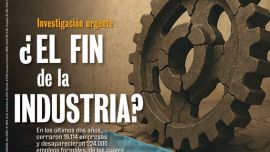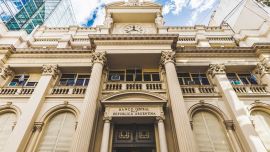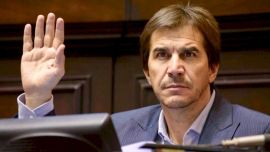THE WEEK IN CORONAVIRUS
There were 1,915,362 confirmed cases of coronavirus and 47,775 deaths at press time yesterday as against 1,853,830 cases and 46,575 deaths the previous Friday. Last weekend Vice-President Cristina Fernández de Kirchner received her Sputnik V jab in Avellaneda, not from any ordinary nurse or doctor but from no less than Buenos Aires Province Deputy Health Minister Nicolás Kreplak, a La Cámpora militant, who gushed: “The pandemic is leaving us some difficult moments but also some beautiful ones to be remembered forever – our dearest Cristina Kirchner offering her shoulder as always in her infinite solidarity and love.” In a week beginning with a scorching heat wave prompting a “violet alert” (sparking forest fires in various parts of the country), Russian health authorities warned of delays in Sputnik V deliveries (after having promised 4.7 million doses for this month) while President Alberto Fernández on Tuesday asked airlines to halve air traffic with Brazil as well as reducing flights from the United States, Europe and Mexico by 30 percent in order to lower the risk from new strains of Covid-19. On Thursday a Moscow-bound flight returned with only 220,000 doses of Sputnik V vaccine and not the promised 600,000. President Fernández made coronavirus the centre of his brief virtual message to the Davos Economic Forum on Thursday, ruling out any rigid quarantines this year while also throwing in some criticism of capitalism as well as “other viruses like toxic and irresponsible debt.” At press time yesterday President Fernández was poised to announce the extension of social distancing (DISPO) throughout the month of February.
FORMOSA HUMAN RIGHTS ROW
Human Rights Secretary Horacio Pietragalla travelled to Formosa on Wednesday at the province’s invitation to verify conditions at coronavirus isolation centres, following a media scandal. But the next day he dismissed denunciations of human rights violations as a “joke” following meetings with opposition leaders, firmly defending Formosa’s Peronist Governor Gildo Insfrán. Over the weekend a group of Catholic priests denounced the “authoritarian” sanitary policies of the Insfrán administration violating human rights, a stance endorsed by Anglican Bishop Nick Drayson. On Monday Senate Majority Leader José Mayans (Frente de Todos-Formosa) complained that 6,000 people had died in the national capital yet nobody was criticising City Mayor Horacio Rodríguez Larreta. Along similar lines Pietragalla said on Thursday that the City mayor was guilty of worse human rights violations than Insfrán in locking up air passengers in hotels. This one looks set to rumble on.
TRADE FIGURES
Argentina’s trade volume dropped 14.9 percent last year to US$97.24 billion while posting a trade surplus of US12.528 billion (also down from the 2019 surplus of US$15.99 billion), Indec statistics bureau reported on Tuesday. December registered the only trade deficit of the year, US$364 million. In all 12 months of 2020, exports totalled US$54.884 billion, 15.7 percent less than the previous year (down 13.2 percent in volume and 2.9 percent in price) while imports were US$42.356 billion, 13.8 percent less than in 2019 (with volume down 10.7 percent and prices 3.5 percent lower). Argentina’s main trade partner was Brazil with US$7.956 billion in exports and US$8.685 billion in imports, followed by China (US$5.394 billion in exports and US$8.664 billion in imports) with the United States (US$3.313 billion in exports and US$4.414 billion in imports) in third place – negative figures with all three despite the overall surplus. On the same day INDEC reported that economic output fell 3.7 percent year-on-year last November with a 2020 economic contraction of -10.6 percent through to last month.
ASADOS PARA TODOS
President Alberto Fernández last Monday signed an agreement with meatpackers, supermarkets and butchers to lower prices by up to 30 percent on the 10 cheapest cuts of beef. "While appreciating your export efforts, I ask you to look after Argentine pockets," Fernández told sector representatives in reference to basic food prices surging 45.5 percent last year as against overall inflation of 36.1 percent. The agreement extends to a monthly 6,000 tons, which sector experts considered insignificant given an average monthly domestic consumption ranging between 200,000 and 300,000 tons with this month’s inflation expected to top four percent.
MARKET UPDATE
The parallel “blue” dollar dropped three pesos down from the previous Friday for the third week running to close at 153 pesos as against an official exchange rate of 92.70 pesos (plus a 65 percent surcharge for purchases by savers), according to Banco Nación. Information on the unofficial but legal CCL and MEP exchange rates was unavailable at press time yesterday. Country risk close yesterday at 1,441 points, slightly up from 41,432 points the previous Friday.
YPF MAKES ANOTHER OFFER
YPF has improved its offer to reschedule its debt of US$6.2 billion by proposing to make some interest payments this year and next, something which it had previously shunned. The initial offer had run into heavy resistance with last Monday’s creditor assemblies to discuss the issue failing to reach quorum. YPF had been forced into the rescheduling by last September’s Central Bank resolution denying companies the dollars to pay short-term debt.
CHILE STATE VISIT
President Alberto Fernández paid a cordial visit to Chile last Tuesday, downplaying his ideological differences with his centre-right Chilean counterpart Sebastián Piñera and regretting that he had not pursued greater unity across the Andes in the past. The two presidents signed three agreements covering pandemic co-operation, speedier frontier crossings and mutual recognition of driving licences. For the second time in two months President Fernández contradicted a foreign minister – this time not Felipe Solá but Chile’s Andrés Allamand, who said that the two presidents had discussed Venezuela.
ABORTION LAW SETBACK
The abortion law approved late last year suffered its first setback last Thursday in the northern province of Chaco when local judge Marta Aucar decided to suspend the law in provincial territory in the light of an injunction presented by a pro-life group as infringing Chaco norms. Abortion "restricts, violates, limits and alters the existence and the exercise and enjoyment of the right to life of the unborn child, protected since conception by the legal order," ruled the judge. The Chaco provincial government has the right to appeal the decision, which could go all the way to the Supreme Court, and provincial Health Undersecretary Carolina Centeno commented: "The abortion law has been approved by representatives of the people. The provincial government will continue pushing this right to protect women."
OUTRAGE AT ABUSER
The case of a Venezuelan girl of 18, presumably drugged and raped during a job interview last weekend, has caused a public and political uproar after judge Karina Zucconi released the accused shopkeeper pending further investigation of the case because of his lack of a criminal record. Police found the girl half-naked and semi-conscious in the Once clothing shop where she was seeking a job. Before losing consciousness the girl managed to telephone her family who called the police. Zucconi’s decision prompted a protest march organised by the Venezuelan community on Thursday which neither rainfall nor the pandemic could deter. City Mayor Horacio Rodríguez Larreta tweeted: "All my support to the young Venezuelan and her family. There are situations which cannot continue. The release of the rapist has to worry us all," a reaction which found him on the same page as Diosdado Cabello, Venezuela’s second-most important politician, as well as a cascade of social network messages.
MACRI FOUNDS FOUNDATION
Ex-president Mauricio Macri on Monday presented the Fundación Mauricio Macri, accompanied by a call for classroom education. He described the latter as the main aim of his new foundation, which will be "dedicated to working on different bills and initiatives but very specially towards promoting quality education. Education cannot be an issue only for teachers, the authorities who temporarily govern and far less trade unions, who cannot own the future of millions of people – it is a fundamental issue for every family which knows that the future of its children will depend on what they learn in school." Macri described an entire school year lost as “unpardonable and perhaps irreparable damage.” Critics described the move as opportunistic, Meanwhile the Juntos por el Cambio opposition continues to organise its February 9 march calling for classrooms to be re-opened.
MORE MALVINAS PRESSURE
Argentina on Wednesday asked the Pan-American Health Organisation (PAHO) to correct its "error" of calling the Malvinas the Falkland Islands. On another multilateral front, Portugal, which is assuming the presidency of the European Union in the first half of this year, has communicated its interest in steering the EU-Mercosur agreement via a visit of its ambassador José Frederico Viola de Drummond Ludovice to the Perfil newsroom last Tuesday.
























Comments